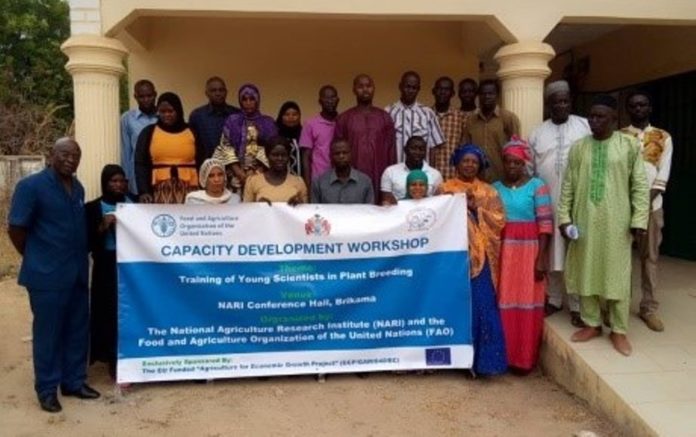Abdoulai G. Dibba
The National Agricultural Research Institute (NARI), with funding from the EU funded Agriculture project being implemented by FAO in the Gambia, recently completed a five-day training program for young Gambian scientists on groundnut breeding.
The event which was held at the NARI conference hall, brought together twenty-six participants: NARI, The Gambia College School of Agriculture, the National Seed Secretariat, and the National Coordinating Organization of Farmer Associations in the Gambia (NACOFAG).
The training aims to develop the next generation of home-grown crop and plant breeders to adapt to modern tools for enhancing the precision and efficiency of their breeding programs.
According to the organizers, the objective of the training is to provide participants with the theoretical knowledge on modern plant breeding methods and techniques; that after the course, participants will be able to adopt good principles of breeding methodologies and will improve the quality of their research and enhance their knowledge.
In his statement at the opening, the Director General of NARI Ansumana Jarju, reminded the young research scientists that the training was just the beginning; that they do not have to become professors to be breeders. He said the course will provide a theoretical background on modern breeding methods and techniques including the use of biotechnology, experimental techniques, planning, information management tools and software, to be able to adopt good principles of breeding methodologies and to improve the quality of their research.
The FAO Consultant Moussa Sie, said the course became a requirement because there is no breeder at NARI and the University of the Gambia is not providing such a breeding program.
Sie said the course will combine both theory and practice and will provide opportunity for participants to share experiences with other crop breeders, to enable them have latest updates in areas of relevance in rice breeding and the worldwide exchange of rice genetic resources. Professor Sie said Gambia is a net importer of food and produces only half of its national requirement of staple foods. “The government’s effort to address the deficit in the agriculture sector has resulted in designing a project which aims to create sustainable production and productivity of crops and livestock, reduce food insecurity and malnutrition, and create the enabling environment for an improved national economy,” he concluded.
NARI’s Crop Research Director Kebba Drammeh, said the institute has been handicapped in the area of research for some time now and the training will assist in the creation of the next generation of researchers. Drammeh continued that for nearly thirty years or more, NARI has been depending on outside expertise for crop plant breeding; that the training is expected to lift the burden of relying on outside breeders when the need arises.
“Our gene bank is dysfunctional. We therefore hope that this training and the continuous support from FAO, will go a long way in assisting us build our Gene Bank once again,” he concludes.
Crop breeding is the art and science of improving important agricultural plants for the benefit of humankind.


















